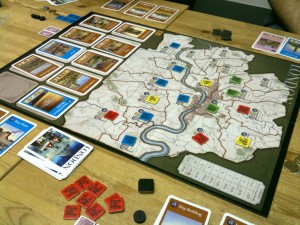Review: London
Posted by James (admin) on August 16th, 2011
 London is a primarily card-based game where players construct buildings in their parts of the city and run their city to generate as much income with as little poverty as possible. The player with the most victory points (VPs) at the end of the game wins.
London is a primarily card-based game where players construct buildings in their parts of the city and run their city to generate as much income with as little poverty as possible. The player with the most victory points (VPs) at the end of the game wins.
On a player’s turn, they can play cards (the game’s core mechanic), run their city, buy land or take 3 cards. To play a card (which builds the building on it), a player must discard a card of the same colour as well as sometimes pay any extra monetary cost. Each card gives you benefits of different types – some instant, some when running your city – such as money, VPs based on the buildings in play, the power to re-use a buildings’ ability, etc. This seems simple enough as you try to build a city that will work well in combination; however, players must weight up two other elements too: first, discarded cards become available for other players to pick up and, secondly, you must either place your new card on top of one you already built (thus destroying the old one) or place it next to your other buildings. The more separate building cards you have in play, the more poverty your city creates, but then you have more buildings. (When you play cards, you can play as many as you like.)
The other main a player can do is to run their city. This means you get to activate each of your buildings once which will give you VPs, cash, etc. but, once used, many cards become useless. Again, this seems simple but you need to select when to run your city carefully because doing so creates poverty. You gain poverty equal to the number of building stacks you have, plus the number of cards in your hand, minus the number of boroughs on the board you own. So, buying boroughs of London on the board not only gives you a one-time bonus of cash and VPs but also reduces the poverty when running your city. At the end of the game, the more poverty you have beyond the player with the least scores you minus VPs.
As this is a game by Martin Wallace, players can take cash loans at any time but these must be paid back (£10 loan costs £15) or score minus 7 VPs. If ever there was a man who can teach the worlds that taking loans can be very tempting but doing so carelessly will be our ultimate downfall, it’s Martin Wallace.
 Overall, London is a very tight game that requires thinking and has lots of elements to balance – the hallmarks of a Martin Wallace game. I haven’t liked every game he has designed but they’re usually good; however, London is especially good. The decisions are multi-layered as you work out in what order you need to do things, which cards will work well in combination,should you build lots of buildings or have a small city to avoid poverty.
Overall, London is a very tight game that requires thinking and has lots of elements to balance – the hallmarks of a Martin Wallace game. I haven’t liked every game he has designed but they’re usually good; however, London is especially good. The decisions are multi-layered as you work out in what order you need to do things, which cards will work well in combination,should you build lots of buildings or have a small city to avoid poverty.
Running your city well is critical to success especially as it takes a whole turn to do so, so you need to get something out of it. The first time I ran my city I was really pleased but after that I found my next buildings didn’t really do enough to be worthwhile and I floundered a bit.
However, there seem to be lots of strategies you can take too. One player in my game owned lots of boroughs and built very few buildings but scored lots of VPs from having buses (a building card which scores based on boroughs owned) which was an interesting approach. Allowing poverty to build up at the start can be solved later if you focus on it. As the cards are drawn from a deck, each game is will be slightly different, and each game develops too as the better and bigger value cards are always further down the deck.
It’s a game that you are unlikely to do well at the first time because playing it once will show you what cards are available and what works well together; however, I still found my first game enjoyable (which is not always the case with games that are better with prior knowledge). Getting stuck in analysis paralysis can be too easy as you work out the most efficient way of running your city or which cards you should use and which you should discard – so, it’s important you keep the game flowing.
London isn’t a game for people that don’t like lots of calculating and/or efficiency engine building. However, it’s a great Eurogame which delivers a great deal of gameplay from just one set of cards.
James.
[Played with 4 players][
P.S. Martin Wallace for Chancellor of the Exchequer.

